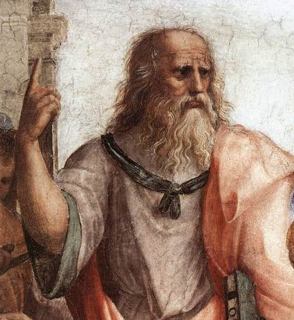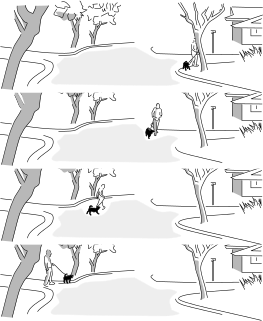Related Research Articles
In the Platonic, Neopythagorean, Middle Platonic, and Neoplatonic schools of philosophy, the demiurge is an artisan-like figure responsible for fashioning and maintaining the physical universe. The Gnostics adopted the term demiurge. Although a fashioner, the demiurge is not necessarily the same as the creator figure in the monotheistic sense, because the demiurge itself and the material from which the demiurge fashions the universe are both considered to be consequences of something else. Depending on the system, they may be considered to be either uncreated and eternal or the product of some other entity.

In philosophy, idealism is a diverse group of metaphysical views which all assert that "reality" is in some way indistinguishable or inseparable from human perception and/or understanding, that it is in some sense mentally constituted, or that it is otherwise closely connected to ideas. In contemporary scholarship, traditional idealist views are generally divided into two groups. Subjective idealism takes as its starting point that objects only exist to the extent that they are perceived by someone. Objective idealism posits the existence of an objective consciousness which exists before and, in some sense, independently of human consciousness, thereby bringing about the existence of objects independently of human minds. In the early modern period, George Berkeley was often considered the paradigmatic idealist, as he asserted that the essence of objects is to be perceived. By contrast, Immanuel Kant, a pioneer of modern idealist thought, held that his version of idealism does “not concern the existence of things”, but asserts only that our “modes of representation” of them, above all space and time, are not “determinations that belong to things in themselves” but essential features of our own minds. Kant called this position “transcendental idealism”, holding that the objects of experience relied for their existence on the mind, and that the way that things in themselves are outside of our experience cannot be thought without applying the categories which structure all of our experiences. However, since Kant's view affirms the existence of some things independently of experience, it is very different from the more traditional idealism of Berkeley.

The problem of universals is an ancient question from metaphysics which has inspired a range of philosophical topics and disputes. Should the properties an object has in common with other objects, such as color and shape, be considered to exist beyond those objects? And if a property exists separately from objects, what is the nature of that existence?

Platonic realism is the philosophical position that universals or abstract objects exist objectively and outside of human minds. It is named after the Greek philosopher Plato who applied realism to such universals, which he considered ideal forms. This stance is ambiguously also called Platonic idealism but should not be confused with idealism as presented by philosophers such as George Berkeley: as Platonic abstractions are not spatial, temporal, or mental, they are not compatible with the later idealism's emphasis on mental existence. Plato's Forms include numbers and geometrical figures, making them a theory of mathematical realism; they also include the Form of the Good, making them in addition a theory of ethical realism.

Time is the indefinite continued progress of existence and events that occur in an apparently irreversible succession from the past, through the present, into the future. It is a component quantity of various measurements used to sequence events, to compare the duration of events or the intervals between them, and to quantify rates of change of quantities in material reality or in the conscious experience. Time is often referred to as a fourth dimension, along with three spatial dimensions.
The analogy of the divided line is presented by the Greek philosopher Plato in the Republic (509d–511e). It is written as a dialogue between Glaucon and Socrates, in which the latter further elaborates upon the immediately preceding Analogy of the Sun at the former's request. Socrates asks Glaucon to not only envision this unequally bisected line but to imagine further bisecting each of the two segments. Socrates explains that the four resulting segments represent four separate 'affections' (παθήματα) of the psyche. The lower two sections are said to represent the visible while the higher two are said to represent the intelligible. These affections are described in succession as corresponding to increasing levels of reality and truth from conjecture (εἰκασία) to belief (πίστις) to thought (διάνοια) and finally to understanding (νόησις). Furthermore, this analogy not only elaborates a theory of the psyche but also presents metaphysical and epistemological views.

The cosmos is the Universe. Using the word cosmos rather than the word universe implies viewing the universe as a complex and orderly system or entity; the opposite of chaos. The cosmos, and our understanding of the reasons for its existence and significance, are studied in cosmology – a very broad discipline covering any scientific, religious, or philosophical contemplation of the cosmos and its nature, or reasons for existing. Religious and philosophical approaches may include in their concepts of the cosmos various spiritual entities or other matters deemed to exist outside our physical universe.
Reality is the sum or aggregate of all that is real or existent within a system, as opposed to that which is only imaginary. The term is also used to refer to the ontological status of things, indicating their existence. In physical terms, reality is the totality of a system, known and unknown. Philosophical questions about the nature of reality or existence or being are considered under the rubric of ontology, which is a major branch of metaphysics in the Western philosophical tradition. Ontological questions also feature in diverse branches of philosophy, including the philosophy of science, philosophy of religion, philosophy of mathematics, and philosophical logic. These include questions about whether only physical objects are real, whether reality is fundamentally immaterial, whether hypothetical unobservable entities posited by scientific theories exist, whether God exists, whether numbers and other abstract objects exist, and whether possible worlds exist.

Eternalism is a philosophical approach to the ontological nature of time, which takes the view that all existence in time is equally real, as opposed to presentism or the growing block universe theory of time, in which at least the future is not the same as any other time. Some forms of eternalism give time a similar ontology to that of space, as a dimension, with different times being as real as different places, and future events are "already there" in the same sense other places are already there, and that there is no objective flow of time.
"Form of the Good", or more literally "the idea of the good" is a concept in the philosophy of Plato. It is described in Plato's dialogue the Republic (508e2–3), speaking through the character of Socrates. This form is the one that allows a philosopher-in-training to advance to a philosopher-king. It cannot be clearly seen or explained, but it is the form that allows one to realize all the other forms. The definition of the Good is a perfect, eternal, and changeless Form, existing outside space and time, in which particular good things share.
Mimesis is a term used in literary criticism and philosophy that carries a wide range of meanings, including imitatio, imitation, nonsensuous similarity, receptivity, representation, mimicry, the act of expression, the act of resembling, and the presentation of the self.

Julian Barbour is a British physicist with research interests in quantum gravity and the history of science.
The principle of plenitude asserts that the universe contains all possible forms of existence. The historian of ideas Arthur Lovejoy was the first to trace the history of this philosophically important principle explicitly. Lovejoy distinguishes two versions of the principle: a static version, in which the universe displays a constant fullness and diversity, and a temporalized version, in which fullness and diversity gradually increase over time.

Evolutionary ethics is a field of inquiry that explores how evolutionary theory might bear on our understanding of ethics or morality. The range of issues investigated by evolutionary ethics is quite broad. Supporters of evolutionary ethics have claimed that it has important implications in the fields of descriptive ethics, normative ethics, and metaethics.
The End of Time: The Next Revolution in Our Understanding of the Universe, also sold with the alternate subtitle The Next Revolution in Physics, is a 1999 popular science book in which the author Julian Barbour argues that time exists merely as an illusion.
Metaphysics is the branch of philosophy that investigates principles of reality transcending those of any particular science. Cosmology and ontology are traditional branches of metaphysics. It is concerned with explaining the fundamental nature of being and the world. Someone who studies metaphysics can be called either a "metaphysician" or a "metaphysicist".
The theory of Forms or theory of Ideas is a philosophical theory, concept, or world-view, attributed to Plato, that the physical world is not as real or true as timeless, absolute, unchangeable ideas. According to this theory, ideas in this sense, often capitalized and translated as "Ideas" or "Forms", are the non-physical essences of all things, of which objects and matter in the physical world are merely imitations. Plato speaks of these entities only through the characters of his dialogues who sometimes suggests that these Forms are the only objects of study that can provide knowledge. The theory itself is contested from within Plato's dialogues, and it is a general point of controversy in philosophy. Nonetheless the theory is considered to be a classical solution to the problem of universals.
The End of Time may refer to:

Sequart Organization is an online magazine that focuses on the study of popular culture and the promotion of comic books as an art form. Sequart also publishes books and produces documentary films. It was founded in 1996 by Dr. Julian Darius. Sequart's editor-in-chief is Mike Phillips.
The timeless universe is the philosophical and ontological view that time and associated ideas are human illusions caused by our ordering of observable phenomena. Unlike most variants of presentism and eternalism, the timeless universe entirely rejects the notion of the reality of any time, arguing that it is exclusively a human illusion, and since the universe can know no time, no dimension of time can be permitted in any theoretical explanation of parts of the observable universe. All purported measurements of time must hence according to this view be correlation measurements between movements, as stated by physicist Ernst Mach in 1883:
It is utterly beyond our power to measure the changes of things by time. Quite the contrary, time is an abstraction at which we arrive by means of the changes of things; made because we are not restricted to any one definite measure, all being interconnected.
References
- The End of Time: The Next Revolution in Our Understanding of the Universe, 1999, ISBN 0-297-81985-2 ; 2000, ISBN 0-19-511729-8 (paperback: ISBN 0-7538-1020-4)